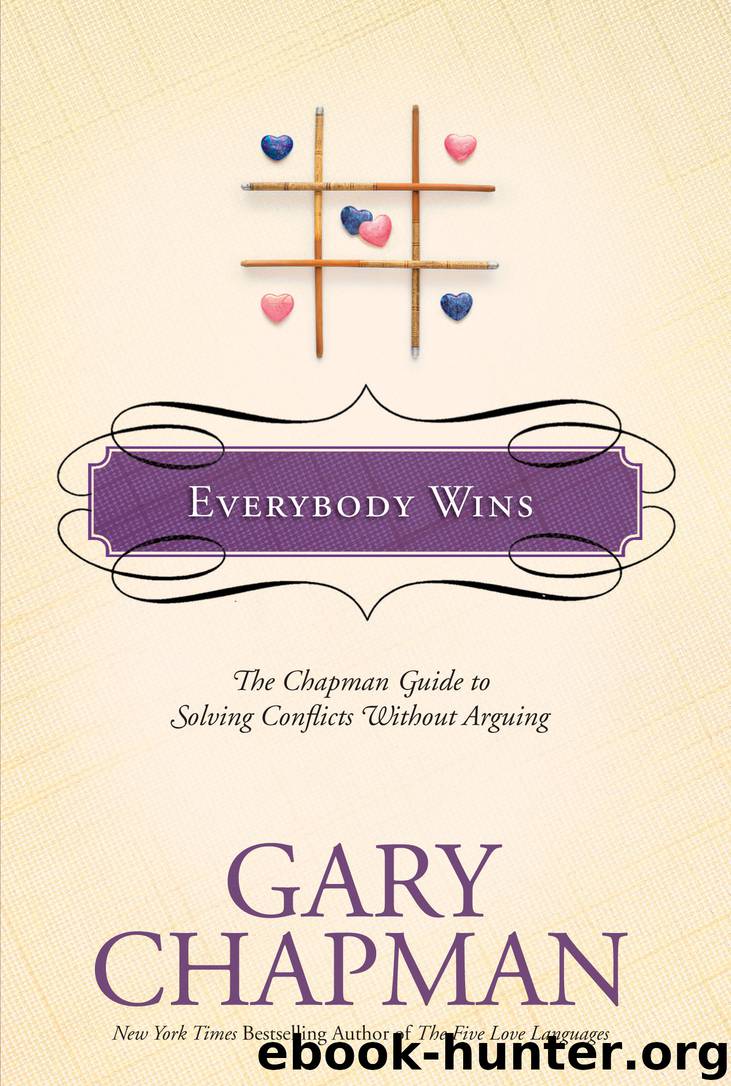Everybody Wins by Gary Chapman

Author:Gary Chapman
Language: eng
Format: epub
Tags: RELIGION / Christian Life / Love & Marriage, FAMILY & RELATIONSHIPS / Marriage & Long Term Relationships
Publisher: Tyndale House Publishers, Inc.
Published: 2006-12-04T05:00:00+00:00
SHARE YOUR OWN IDEAS ONLY WHEN YOUR SPOUSE FEELS UNDERSTOOD
The fourth characteristic of empathetic listening is that you never share your own perspective until your spouse has assured you that he or she feels understood. The most common mistake couples make in communication is responding before they have the full picture. This inevitably leads to arguments. Listen for as long as your spouse has something to say. Use clarifying questions to make sure you understand what he or she is thinking and feeling. When your spouse assures you that he or she feels that you understand, then it is time to give your own perspective. Often, determining this right time is best done with a series of questions:
“Do you feel that I understand what you are saying?” If your spouse says no, then let him or her continue explaining.
“Do you think I understand how you feel?” Again, if not, then let your spouse explain more fully.
When the answer to both questions is yes, then you can ask, “Can I tell you what I’m thinking and feeling?” If your spouse says yes, then you can proceed to share your perspective. Your spouse now becomes the listener.
The fact that your spouse now feels heard and understood makes it easier to shift from the arguing mode to the listening mode. Now your spouse can honestly say to you, “I’m ready to hear you because I feel as if you understand my concerns. I know that you have a perspective that is equally as valid as mine, and I want to hear it.” Your spouse now gives you his or her undivided attention, repeating what you say and asking clarifying questions until you feel heard and understood.
Empathetic listening creates a positive emotional climate. Arguing creates a negative emotional climate. Conflicts are resolved more easily when the climate is friendly rather than adversarial.
Had David failed to practice empathetic listening when JoAnne first mentioned her concerns about the garbage, he might have said, “Okay, I’ll take the garbage out. Don’t bring it up again.” The conversation would have been over, but the conflict would not have been resolved. It was because he fully heard her perspective before he responded that they were able to resolve their conflict easily. When people respond too quickly, they often respond to the wrong issue. They need to listen long enough—and ask enough clarifying questions—to discover what is really at the heart of their spouse’s complaints.
Many times, the real conflict is not about football or which color to paint the bathroom walls but about personality differences or unmet emotional needs. For example, people with a controlling personality will feel emotionally unsettled if things are not done in a timely manner and with some degree of perfection. On the other hand, people with low self-esteem may feel condemned if their spouse expresses strong expectations. Feeling condemned may lead either to “fighting back,” trying to prove their worth, or to withdrawing in silent suffering.
Empathetic listening allows us to hear what is going on beyond or underneath the words that are being said.
Download
This site does not store any files on its server. We only index and link to content provided by other sites. Please contact the content providers to delete copyright contents if any and email us, we'll remove relevant links or contents immediately.
The 5 Love Languages: The Secret to Love That Lasts by Gary Chapman(9767)
The Space Between by Michelle L. Teichman(6920)
Assassin’s Fate by Robin Hobb(6191)
Wiseguy by Nicholas Pileggi(5757)
Everything Happens for a Reason by Kate Bowler(4725)
Gerald's Game by Stephen King(4630)
Pillow Thoughts by Courtney Peppernell(4265)
A Simplified Life by Emily Ley(4154)
The Power of Positive Thinking by Norman Vincent Peale(4050)
Harry Potter and the Prisoner of Azkaban (Book 3) by J. K. Rowling(3343)
Resisting Happiness by Matthew Kelly(3332)
Girl, Wash Your Face by Rachel Hollis(3273)
Being Aware of Being Aware by Rupert Spira(3264)
The Code Book by Simon Singh(3166)
The Secret Power of Speaking God's Word by Joyce Meyer(3149)
More Language of Letting Go: 366 New Daily Meditations by Melody Beattie(3017)
Real Sex by Lauren F. Winner(3001)
Name Book, The: Over 10,000 Names--Their Meanings, Origins, and Spiritual Significance by Astoria Dorothy(2967)
The Holy Spirit by Billy Graham(2937)
